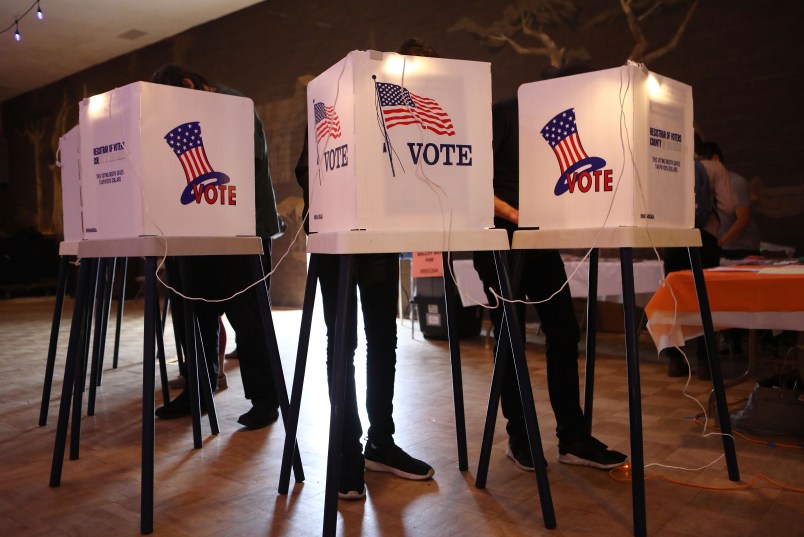This article is part of TPM Cafe, TPM’s home for opinion and news analysis.
On Sunday, in commemoration of the anniversary of Bloody Sunday, the Biden administration took its first major executive action on voting rights. And it was an important one, leveraging the power of federal agencies to lower the barriers to voting, particularly the barriers to voter registration. While this action was significant for many voters who have been historically left behind by our democracy, it was truly historic for one often overlooked constituency: those affected by the criminal justice system.
Voting is and has long been incredibly difficult for justice-involved voters. Because of complicated and arcane criminal disenfranchisement laws that vary state-to-state, justice-involved voters often do not know when contact with the criminal justice system impacts their eligibility to vote and, if they have been disenfranchised, what steps they need to take in order to have their rights restored. The stakes are also high for these voters, because misunderstanding the law can lead to potentially criminal consequences. As a result, millions of Americans with past convictions sit out of elections out of fear or confusion.
Navigating this system — and casting a ballot — is even more complicated for eligible would-be voters who find themselves behind bars on Election Day. These voters can include those serving time for misdemeanors (for which you almost never lose the right to vote), those held pretrial, or those in jurisdictions that have no felony disenfranchisement (Maine, Vermont and D.C.). Overall, there are upwards of 750,000 such eligible incarcerated voters in any given election. But despite their eligibility, these voters often do not have access to information about their rights, upcoming elections, or the logistics of how to request and cast a ballot. Neither prisons and jails nor our election infrastructure are set up to serve incarcerated voters. Only a small number of states and localities provide any affirmative support to incarcerated voters, so mail delays, lack of access to necessary IDs and proof of registration, and misinformation often result in de facto disenfranchisement.
This executive order represents the first time the federal government has ever taken action to ensure justice-involved voters can participate equally in our democracy, and it has great potential. Here is why:
First, it directs the Attorney General to establish policies and procedures to provide for voter education, registration, and voting through the Federal Bureau of Prisons (BOP). This is unprecedented. Historically, BOP has refused to share its data with jurisdictions for the purpose of facilitating elections. This is a particular problem for D.C.’s effort to implement universal enfranchisement. Because D.C. does not have its own prison system, all of its incarcerated citizens are spread across hundreds of BOP facilities. Absent BOP coordination, D.C. does not have the information it needs to provide voters with the materials they need. Now, BOP will have its own affirmative obligations to provide voters in its facilities with the support they need to register to vote. If BOP uses this opportunity to build effective elections infrastructure for incarcerated voters, it could create model policies for state and local correctional facilities nation-wide.
Next, it requires the U.S. Marshals Service to include language in its jail and intergovernmental contracts that would mandate local jails using their services to disseminate educational materials, provide registration opportunities, and facilitate voting in their facilities. Most eligible incarcerated voters — again, those in pretrial detention and serving misdemeanor sentences — are incarcerated in state and local, not federal, jails. By tying U.S. Marshal services to voting access, the executive order ensures that these facilities — many of which currently have no policies in place to provide ballot access — must also implement their own election procedures.
Finally, the executive order seeks to deliver accurate voter educational materials and direct support to justice-involved voters using as many means as possible, including upon their release from incarceration, through Pretrial and Probation Services, and through Vote.gov. As I have done this work, it is hard to avoid stories of misinformation like the election official who could not convince her formerly incarcerated son, no matter how hard she tried, that he was eligible to vote or the probation office that told clients that were eligible to vote upon release from prison that they had to wait seven years. To combat misinformation, Vote.gov should include a tool like my organization Campaign Legal Center’s RestoreYourVote tool that makes eligibility information not only available but accessible and easy to understand.
Instead of informing voters only when they cannot participate, we need more laws that inform justice-involved voters when and how they can cast their ballots. Sunday’s executive order is a good start.
Dana Paikowsky is an attorney and Equal Justice Works Fellow at Campaign Legal Center (CLC) where she advocates for justice-involved voters across the U.S.







Great story. More should know about Biden’s Exec Order and understand it.
I’m glad to see this. I had been wondering what the executive order could really do in the absence of legislation and it turns out it’s a pretty substantive.
We still need to pass HR 1 and the John Lewis Act, but this is a good use of an executive order.
It’s not flashy, it’s not a magic bullet, but it’s still 750,000 people who are no longer being denied the right to vote.
And it may also even ultimately reduce some kinds of crime.
All adult humans who reside in a community should be enfranchised and required to vote (by mail, of course).
All of them. Prisoners, immigrants, foreign students, everyone. The arguments against this all amount to, “some people aren’t worth as much as others.”
So … if I may add something:
Dana Paikowsky, the author of the article, works at CLC, which, among other things, helps get this issue into the courts.
Anyone who can help fund this work should please do so. Thanks.